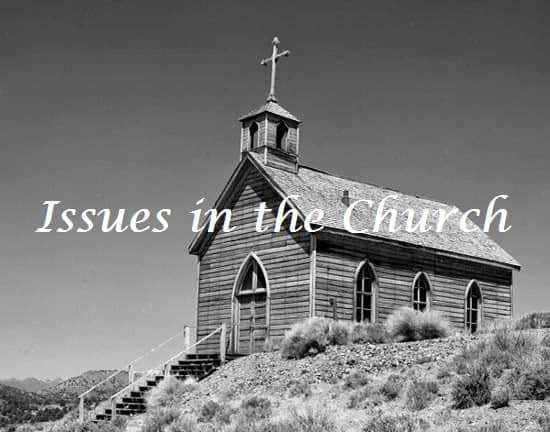⏱️ Estimated Reading Time: 5 min read
Editor’s note: The purpose of this series is to write on “Issues in the Church” that either aren’t talked about, ignored entirely, or that we want to contribute to the discussion on. Our goal with this series is to help our readers think through these issues from a biblical worldview with lots of practical gospel-application.
- Read the rest of the series here.
**************************************************
In seminary, I used to sit with a large pile of books at coffee shops in the Greater Boise, Idaho area to work on homework. More often than not during the day, some people would approach me and want to know what I was studying. These conversations would typically go one of two ways. The first person and I would have a conversation about their life and ministry. During the course of our conversation, it became clear that they loved Jesus and the local church.
More often than not sadly, I would have conversations with Christians who never went to a local church. These conversations were often very short. After asking me about my homework, I would ask them where they went to church, only to be told they never went.
In this article, we will briefly consider the place of the local church in the Christian life and how loving Jesus entails a love for the local church.
The Place of the Local Church in the Christian Life
The purpose of the church is to glorify God (Eph. 3:21) by building itself up in the faith (Eph. 4:13-16), by instruction of the Word (2 Tim. 2:2, 15; 3:16-17), fellowship (Acts 2:47; 1 John 1:3), keeping the ordinances (Luke 22:19; Acts 2:38-42) and advancing and communicating the Gospel to the entire world (Matt. 28:19; Acts 1:8). The calling of all saints is to the work of service (1 Cor. 15:58; Eph. 4:12; Rev. 22:12).
The need of the church is to cooperate with God as He accomplishes His purpose in the world. To that end, He gives the church spiritual gifts. He gives men chosen for the purpose of equipping the saints for the work of the ministry (Eph. 4:7-12). He also gives unique and special spiritual abilities to each member of the body of Christ (Rom. 12:5-8; 1 Cor. 12:4-31; 1 Pet. 4:10, 11).
I regularly met with a friend of mine from my local church to talk about our lives and theology. Neither one of us would define our meetings as having church. Instead, we meet for accountability, for fellowship, and to encourage one another in our walk with God. On Sunday’s Christians gather together and then scatter throughout the week to our various vocations. We don’t scatter to never gather again together with God’s people. Instead, we gather with God’s people on the Lord’s Day to scatter to spread the Gospel.
Loving Jesus, Loving the Church
In Ephesians 5:27, Paul talks about how Christ bled and died, to present the Church blameless before Him. [bctt tweet=”Loving Jesus entails loving the Church. ” username=”servantsofgrace”]
[bctt tweet=”The gathered local church is one that assembles to hear, heed, and obey the preached Word.” username=”servantsofgrace”] All of Paul’s and Peter’s epistles were written to local churches gathering together in community under qualified godly men. It is in the local church that the Christian is to submit to godly elders and pastors. Going to coffee shops and other places to enjoy fellowship, read, and study the Word and godly books with others or privately is great. With that said, coffee shops and other places do not replace the local church and it’s central role in the life of the Christian.
The one another passages in Paul’s letters help fill out what it means to do life in community with God’s people. All who place their faith in Jesus Christ are immediately placed by the Holy Spirit into one united spiritual body, the church (1 Cor. 12:12, 13), the bride of Christ (2 Cor. 11:2; Eph. 5:23-32; Rev. 19:7, 8), of which Christ is the head (Eph. 1:22; 4:15; Col. 1:18). The formation of the church, the body of Christ, began on the day of Pentecost (Acts 2:1-21, 38-47) and will be completed at the coming of Christ for His own (1 Cor. 15:51-52). The church is thus a unique spiritual organism designed by Christ, made up of all born-again believers (Eph. 2:11 – 3:6). The establishment and continuity of local churches are clearly taught in the New Testament (Acts 14:23, 27; 20:17, 28; Gal. 1:2; Phil. 1:1; 1 Thess. 1:1; 2 Thess. 1:1). Members of the Church are directed to associate themselves together in local assemblies (1 Cor. 11:18-20; Heb. 10:25).
Final Thoughts
[bctt tweet=”Loving Jesus leads to loving His people and others who don’t yet know Him. ” username=”servantsofgrace”]You and I need each other as Christians. One Christian may be down in the dumps and need encouragement and care. Another Christian may be hurting and struggling due to how other Christians have treated them in the past. Still others might be going through a variety of life issues. [bctt tweet=”Every single Christians has a great need for Christ and a great Christ for our need.” username=”servantsofgrace”]
Here’s some final encouragement that you and I need to commit ourselves to:
- Encourage those who are Christians but don’t attend a local church to find a local church, and help them do so. Consider inviting them to your own local church.
- Commit to speaking the truth in love to other Christians. Listen intently to their story so you can connect biblical truth to their lives.
- Love Jesus, love the church and intentionally reach out to those in your community with the Gospel.
- The local church is the hope of the world.



